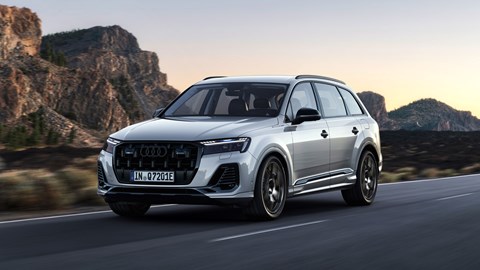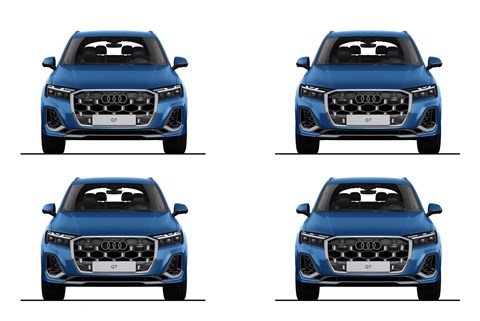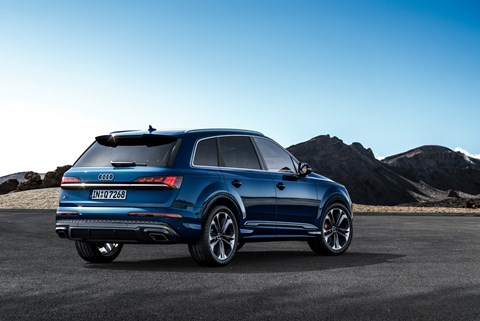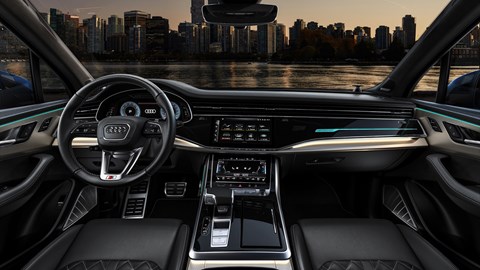► Latest Audi Q7 now available as a plug-in hybrid
► Increased electric range up to 53 miles
► Q7 continues to soldier on
Audi’s newly revised Q7 is now available as a plug-in hybrid, with a choice of versions available and a longer electric range of up to 53 miles.
Now Audi’s oldest model, the Q7 SUV has been given another technology refresh for 2024. It seems Audi is happy to flog its tired and retiring seven-seat SUV-shaped horse a little longer, though a new-generation model has been spied testing.
Of course, we jest somewhat. The Q7 is still a very good premium family car, offering seven-seat space, great build quality and a smooth drive – it’s a favourite among the CAR team.
Tell me about these new hybrids
Plug-in hybrids are nothing new to the Q7, it’s had them since 2016 when it was available as a diesel plug-in hybrid, badged as e-trons, before that nameplate was reserved for fully electric models. That’s how long the current Q7 has been around…

These new plug-in hybrids are lightly revised compared to before, and there’s a choice of a 55 and 60 TFSI e. Each uses a a 3.0-litre petrol engine paired with a redesigned electric motor, with combined outputs of 385bhp and 483bhp respectively. The more powerful of the two can manage a 0-62mph time of 5.0 seconds.
What’s the electric range of the new Q7 plug-in hybrid?
As part of this latest update, the hybrid Q7s also now feature a larger battery pack. Increasing from 17.4kWh to 25.9kWh, it helps to increase the claimed all electric range from 29 to 53 miles. The on-board 7.4kW charger remains the same, however, with a full charge of the battery taking place in less than four hours.
Plug-in hybrid Q7s are also available with all-wheel steering for the first time, along with 48-volt anti-roll stabilisation. Both are options.
So, what’s new for 2024’s Q7?
The updates are mostly cosmetic. New wheels and colours can be had, including Sakhir Gold, Chili Red and Ascari Blue (pictured). In addition, Audi says the Q7 now features four near-imperceptibly-different customisable signatures for its front and rear daytime running lights – much like the Q4 e-Tron.

Other bits of note include the fact the infotainment system can now install apps from third-party companies (like Spotify and Amazon Music). Plus, there’s a wider range of safety kit and remote parking is now available.
Anything else I should know?
Outside of plug-in hybrids, the Q7’s engine range remains the same as before. That means there’s a choice of 45 and 50 TDI diesels as well as a 55 TFSI petrol and the potent (and very likeable) SQ7 with a thumping 500bhp petrol V8.
The petrol and diesel Q7 are already on sale, priced from £67,485, with the hybrids likely to be available to order later in the year. Plug-in hybrid Q7s also don’t get the option of seven seats.
Hasn’t Audi updated the Q7 already?
Yep. The Audi Q7 was last revised in 2019. But that was a more major update designed to mark the mid point of the car’s intended production cycle.

Audi was also conscious that the far newer Mercedes-Benz GLE and BMW X5 were encroaching on its territory. So, it made a broad range of improvements, including an entirely new cabin, tweaked exterior styling and the addition of mild hybrid technology.
Mild hybrid tech joins the party
Let’s face it. Cars like the Q7 are considered by many to be persona-non-grata on Britain’s roads, so Audi hoped its decision to add a hybrid element – if only a mild version – would go some way to making this giant SUV a little more palatable. And, luckily for Audi, it had a ready-made system from the SQ7. Using a belt alternator starter (BAS) to power a 48-volt electrical system, the Q7 can coast for up to 40 seconds between speeds of 34 and 99mph.
What’s more, the start-stop system activates at speeds of up to 13mph, saving precious fuel during endless urban traffic jams. And, for those whose prerogative it is to immediately switch off the start-stop whenever they get in a car, the BAS system is noticeably quicker than a regular starter, which should please even the most impatient of motorists.

Said mild-hybrid system also allows the Q7 to run electromechanical active roll stabilisation (as seen previously on the SQ7), giving the car a tauter feel in the corners without compromising comfort.